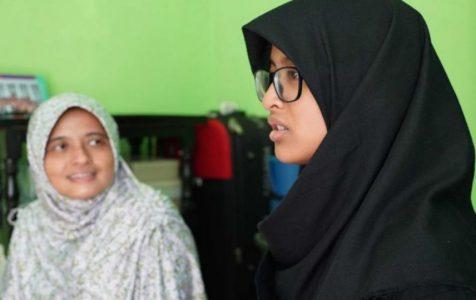
Indonesian girl convinced her entire family to move to Syria to join ISIS terrorist group
Just 15 years old at the time, Nur Dhania said life under Islamic State rule was nothing like the paradise portrayed in the group’s propaganda.
She felt duped — and totally responsible for her family’s predicament.
“I was a spoiled brat. I refused to listen to other people. I was arrogant, stubborn,” she said.
Nur Dhania was the first member of her family to decide to leave Indonesia for the caliphate, a huge swathe of territory stretching from western Syria to eastern Iraq, controlled by the Islamic State.
Incredibly, 25 of her relatives — including her grandmother, sisters, parents, uncles, aunts and cousins — followed her.
But within a year, the family was willing to risk everything to get home.
Nur Dhania first heard about the Islamic State group from her uncle, who is now in prison in Indonesia on terrorism offences.
That year — 2014 — she spent her school holidays glued to social media, where she devoured everything she could find about Islamic State and its promise of a ‘paradise’ in Syria.
She claims she was never radicalised by Islamic State or motivated by jihad, but was instead seduced by the promise of a Utopian life.
“I was mesmerised,” she said, by Islamic State propaganda that offered free housing, education and healthcare; jobs for everyone who joined the cause, and a promise to pay the family’s debts.
She tried to convince her family of the benefits of leaving Indonesia for Syria, and briefly ran away from home when they refused to join her.
Terrified for their daughter’s safety, Nur Dhania’s parents eventually made a stunning choice.
Her father Dwi Djoko Wiwoho abandoned his middle-class job as a respected senior civil servant on Batam Island in Indonesia’s Riau Province.
He sold the family’s main home in Jakarta to fund the voyage to Syria, via Turkey.
In the weeks and months that followed, 26 family members travelled to the Middle East. Seven were detained in Turkey and deported.
But 19 family members, including Nur Dhania and her parents, made it to Raqqa.
As soon as the family arrived in Syria, they were segregated and forced to live apart.
Women and girls were housed in a filthy dormitory with other women they didn’t know. Physical fights and domestic disputes were common, as was theft.
Islamic State fighters regularly came to the dormitory to pressure Nur Dhania, her sisters and other young women to marry. They repeatedly refused.
Nur Dhania’s male relatives were taken to a weeks-long camp to learn about Sharia rule.
They were taught to use weapons, including AK47s and rocket propelled grenades. But Nur Dhania is adamant that her father and uncles refused to fight.
Eventually the family was given a house by Islamic State’s administrators.
But Nur Dhania said that when her male relatives refused to take up weapons to fight, the Islamist regime turned on them.
“They ordered and forced people to go to battle. But the Koran says that not everyone has to go to the war, and some people need to stay in town,” she said.
They expected to find paradise in Raqqa. But within a year, the family was falling apart.
Her grandmother had died from an illness. One uncle had been killed in an airstrike. Another had disappeared altogether.
The 17 survivors decided it was time to make their escape.
Nur Dhania said it was no easy task to find someone willing to smuggle them to the Kurdish border, without betraying them to Islamic State leaders.
One smuggler stole their belongings including money, mobile phones and laptops.
A second smuggler also duped them.
Finally, a third smuggler drove them to the Kurdistan border, where they narrowly avoided being shot by snipers as they passed through a checkpoint.
The family spent two months living in tents in a UN refugee camp guarded by Kurdish forces.
Nur Dhania met a journalist at the camp and told them it was her fault that she and her family had ended up there.
Eventually, Indonesian authorities agreed to facilitate the family’s return.
Two years after they left, the family flew home to Jakarta — but their ordeal was not over.
Indonesian police and anti-terror agents were waiting to detain them as they stepped off the plane.
The entire family was taken into custody by Indonesia’s anti-terror agency BNPT.
Source: ABC





